⚠️ Got an email with “For your own safety, I highly recommend reading this email.” as the subject? Watch out, it’s a scam known as “Sextortion”.
Here’s what it says: The email begins with “Hello, You are in big trouble. But don’t panic right away. Listen to me first, because there is always a way out.” It claims that while you were on adult sites, they put spyware through your browser. This supposed spyware let them get into your webcam, look at your browser history, and all your devices, supposedly allowing them to record you in private. The scammer then threatens to send these supposed recordings to everyone you know unless you pay a ransom, usually asked in Bitcoin, to a specific wallet address.
But here’s the truth: these threats are fake, made to scare you and make you pay money without any real proof of the recordings they say they have.
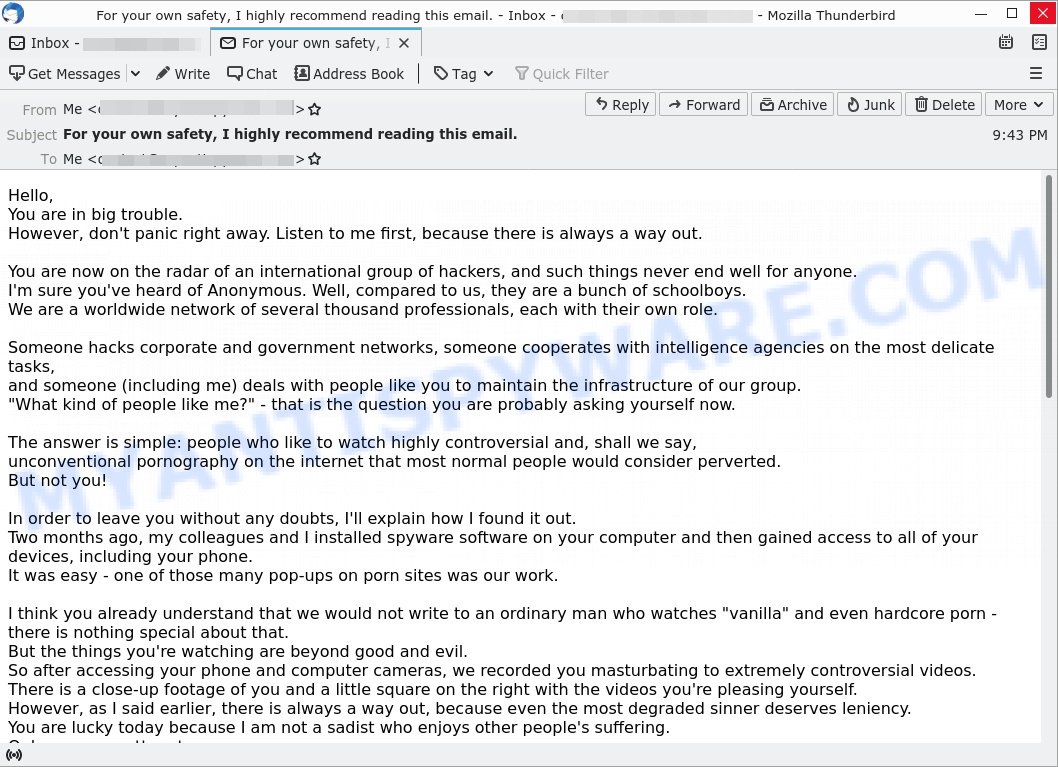
The “For your own safety, I highly recommend reading this email.” Email Scam uses scare tactics and shame to make victims do what they want. It’s important to know that answering these scammers or paying them doesn’t keep you safe; it just shows them you can be tricked into giving money later. Always doubt such scary emails, refusing to pay or give any personal information. Keep your online safety strong, with everything up to date, and be careful about what links you click. Knowing about these scams and thinking carefully are your best protection against these online tricks.
Table of Contents
🚨 Is the “I highly recommend reading this email.” Email a Scam?
Yes, the email with the subject “For your own safety, I highly recommend reading this email.” that claims to have compromising information about you is a scam. 🚫 If you’ve received an email threatening to release videos of you visiting controversial websites unless you pay a ransom, be very cautious. These threats are made-up and designed to exploit your fears to make you pay money.
Here’s what the scam email said:
Hello,
You are in big trouble.
However, don’t panic right away. Listen to me first, because there is always a way out.You are now on the radar of an international group of hackers, and such things never end well for anyone.
I’m sure you’ve heard of Anonymous. Well, compared to us, they are a bunch of schoolboys.
We are a worldwide network of several thousand professionals, each with their own role.Someone hacks corporate and government networks, someone cooperates with intelligence agencies on the most delicate tasks,
and someone (including me) deals with people like you to maintain the infrastructure of our group.
“What kind of people like me?” – that is the question you are probably asking yourself now.The answer is simple: people who like to watch highly controversial and, shall we say,
unconventional pornography on the internet that most normal people would consider perverted.
But not you!In order to leave you without any doubts, I’ll explain how I found it out.
Two months ago, my colleagues and I installed spyware software on your computer and then gained access to all of your devices, including your phone.
It was easy – one of those many pop-ups on porn sites was our work.I think you already understand that we would not write to an ordinary man who watches “vanilla” and even hardcore porn – there is nothing special about that.
But the things you’re watching are beyond good and evil.
So after accessing your phone and computer cameras, we recorded you masturbating to extremely controversial videos.
There is a close-up footage of you and a little square on the right with the videos you’re pleasing yourself.
However, as I said earlier, there is always a way out, because even the most degraded sinner deserves leniency.
You are lucky today because I am not a sadist who enjoys other people’s suffering.
Only money matters to me.Here is your salvation: you must transfer $1490 in Bitcoin to this BTC cryptocurrency wallet: 14Lb7HYptQQ7F5zTX68yYLa525rh6odBCc
You have exactly 48 hours to make the payment, so think less, and do more.
As soon as I receive confirmation of the transaction, I will delete all compromising content and permanently disable our computer worm.
Believe me, I always abide by gentleman’s agreements. Even with people who are hardly gentlemen. Because it’s nothing personal, just business.If I do not receive a payment, I will send all videos of you to every person in your contact list, messengers and email.
Relatives, loved ones, colleagues, friends-everyone you’ve ever been in contact with will receive them.
You understand perfectly well that you will never be able to wash this stain on your reputation.
Everyone will remember you as sick as fuck.
Your life will be completely ruined, and, most likely, only a tightened noose around your neck will be able to save the day.If you haven’t dealt with crypto before, I suppose it won’t be difficult for you to figure it all out.
Simply type in the “crypto exchange” into the search bar and pay with a credit card. Besides, based on your browser history, you are a savvy user.
When you want to, you can dig into the darkest depths of the Internet, so I’m sure you will be able to find out what is what.Here is what my colleagues and I should warn you against:
…Do not reply to this email. Do you really think we are so stupid to be tracked by an email address? This is a temporary disposable email.
As soon as I clicked “Send”, it was gone for good.
…Forget about law-enforcement authorities. As soon as I see that you are trying to contact them, the compromising material will be published.
Remember, I have access to all your devices, and I can even track your movements.
…Do not reset your devices to factory settings and do not try to get rid of your devices.
It won’t help in any way. Look above – my All-seeing eye is watching all your actions. It is easy to hunt you down.I am sorry that we met in such circumstances. Probably, everything could be different if you had been more careful about what you are doing on the Internet.
Watch yourself from now on, because even such things that you previously considered insignificant can destroy your life in the future like a butterfly effect.
I hope this is goodbye forever. However, it depends on you.P.S. The countdown is on. The choice is yours.
Examples of claims made in the scam email:
- While you were on adult sites, I put spyware through your browser.
- I can get into your webcam, look at your browser history, and all your devices, recording you.
- You must send $1250 USD in Bitcoin to my wallet to stop me from sharing these videos.
- Don’t try to contact the police or mess with your devices, as it will make me share the videos right away.
- This message was sent from a system that doesn’t allow replies.
The email uses scary threats to make you feel urgent and afraid. 🚨 The aim? To trick you into sending money to the scammer without any real proof that the claimed videos or information exist. These scammers use the possible shame and panic of their victims to get what they want.
🚩 Red Flags to Watch Out For:
Be careful and doubt the truth of such emails if you see these signs. 🔍🛡️
- 📧 Scary Messages: Emails that scare you and claim to have embarrassing videos or information about you.
- 🔗 Asking for Bitcoin: The scammer asks for payment in Bitcoin, using its hidden nature.
- ⏳ Quick Deadlines: The email sets a fast deadline to make you act quickly out of fear.
- 🖼️ Claims of Spyware: Doubt emails that say they put spyware on your devices without showing any proof.
- ✍️ Threatening Words: These emails often threaten to share private videos or information with everyone you know.
- 👤 Hidden Sender: Scammers usually use email addresses that are temporary or hard to trace to hide who they are.
- 🔄 No Proof Shown: Real claims would likely include some evidence, but scammers just scare you without showing any proof.
🕵️♂️ How the Scam Works
The “For your own safety, I highly recommend reading this email” scam is a type of digital blackmail. Understanding its tactics is important for protecting yourself. 💡🔐
🚨 Fear and Shame
It starts by accusing you of visiting adult sites and uses fear and shame to push you into paying up without questioning the truth.
🔗 Fake Spyware
The scammer lies about installing spyware during your visits to adult sites. They claim this non-existent spyware lets them steal your info and spy on you.
Examples of lies:
- Spyware on all devices
- Access to your webcam and browsing history
- Threats to send these to people you know
🎭 Fake Threats
They claim to have embarrassing videos of you and demand a ransom in digital money to stop sharing these non-existent videos.
📥 Ransom Demand
The scammer wants payment, typically in Bitcoin, to delete the supposed videos and the spyware that actually isn’t there.
🔄 False Control
They pretend they can control your devices and remain anonymous, using digital money and claiming advanced hacking skills.
🕳️ Scare Tactics
The email uses threats to share the fake videos and lies about deleting them for money, trying to make you act quickly out of fear for your reputation.
Examples of such scams
Scammers have developed a variety of tactics to intimidate and exploit unsuspecting individuals. Here are a few common examples:
📹 I RECORDED YOU Email Scam
In this scam, the sender claims to have control over your camera and alleges they have recorded you during private moments. They typically demand payment to keep the footage private. Beware: this is a bluff to get you to pay up out of fear.
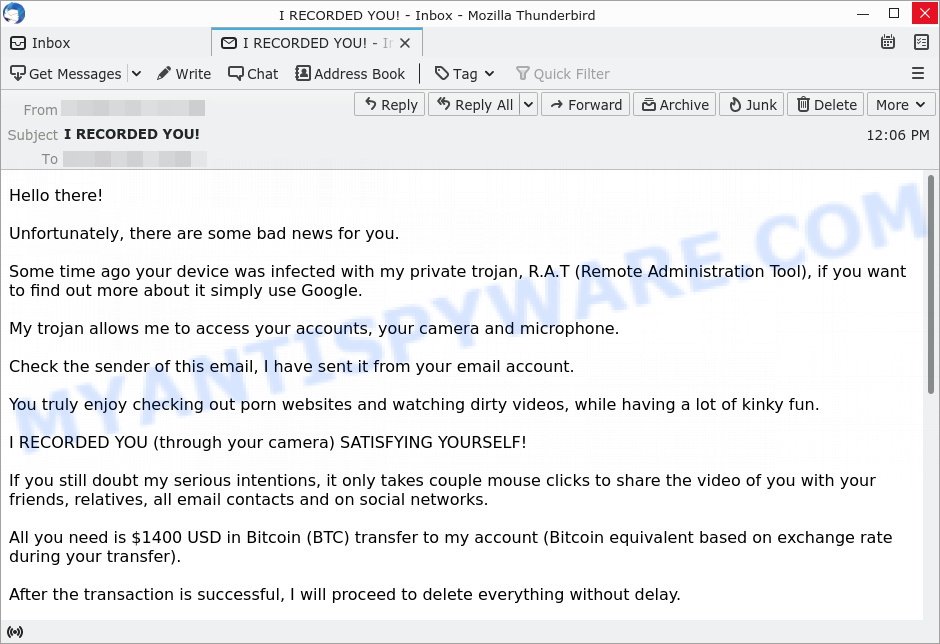
💼 I am a professional hacker EMAIL SCAM
Posing as a hacker, the sender of this email might say they’ve infiltrated your system. They may even claim they have proof of embarrassing activity and will publish it unless you send them money. Remember, a real hacker wouldn’t announce their presence—it’s a tactic to pressure you into paying.
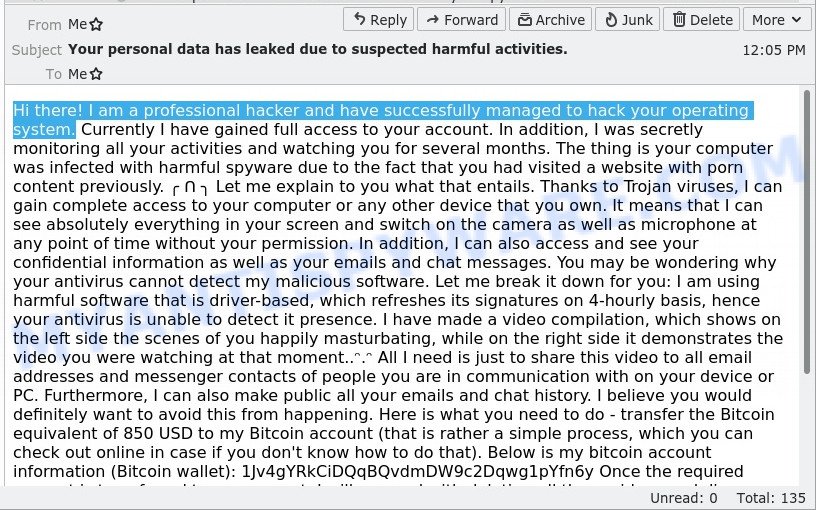
🔒 Your Private Information has been Stolen Email Scam
Here, the scammer will claim they’ve stolen sensitive information from you and threaten to release it unless you pay a ransom. They rely on the scare factor, hoping you’ll pay to protect your reputation, even though they likely have no data at all.
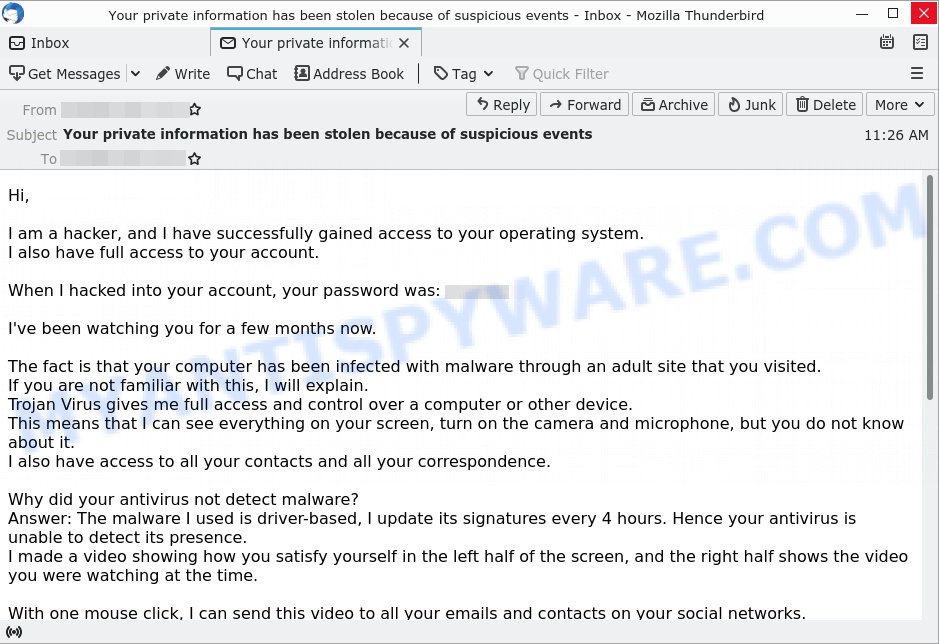
Each of these scams plays on fear and urgency to trick you into acting against your best interest. Always approach such emails with skepticism, verify your security, and do not engage with the scammers.
Should you pay?
No, you should not pay the ransom demanded by the scammer. Remember that this is a scam and paying the ransom will only encourage the scammer to continue their criminal activities! Additionally, paying the ransom can make you a target for future scams. It is important to stay vigilant and protect your personal information from such scams by using strong and unique passwords, enabling two-factor authentication, and regularly updating your computer’s security software. If you receive such an email, it is best to report it to the authorities and your email provider.
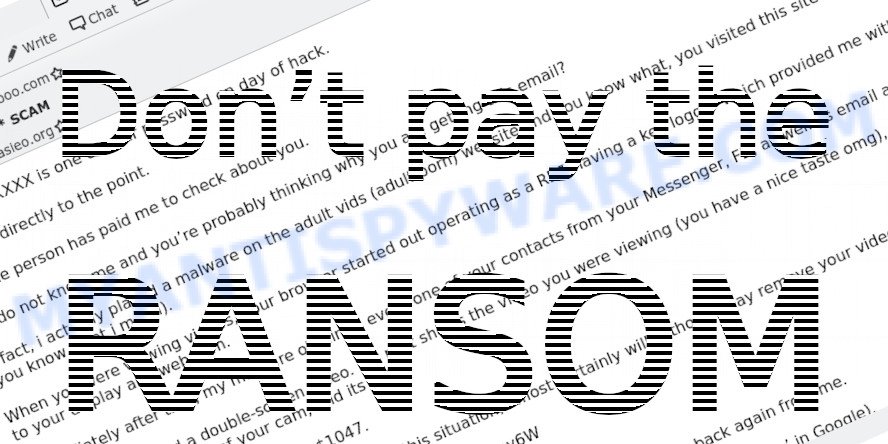
What to Do if You Receive the Email
Receiving the “For your own safety, I highly recommend reading this email” email can be deeply unsettling, but with the right steps, you can ensure safety and peace of mind.

Here’s a specific guide on handling this scam:
Begin by reminding yourself to stay calm. The email is crafted to elicit panic, pushing recipients into rash decisions. Recognize its true nature—a manipulative attempt to exploit fear.
Resist any impulses to pay. Even if you’re tempted to make the problem go away, understand that payment doesn’t guarantee safety. It merely emboldens the scammer, possibly marking you as an easy target for future deceptions.
Do not engage with the scammer. Replying or trying to open a dialogue can inadvertently give away more information, or signal that your email is active, making you a prime candidate for further scams.
Seeing a familiar password can be particularly jarring. If the scam email mentions a password you recognize, it’s essential to check its source. Use services like haveibeenpwned.com to see if your email or credentials have been compromised in any past data breaches.
Subsequent to that, update your passwords. Always choose strong, unique combinations and activate two-factor authentication on platforms that support it.
As a precaution, run a comprehensive security scan on your device. While the scam email’s claims about malware are usually baseless, this step ensures your system remains clean and threat-free.
Report the email to relevant authorities (e.g., FTC). Sharing details with your local law enforcement or cybercrime units can contribute to ongoing investigations and aid in the crackdown on such malicious activities.
Lastly, spread awareness. Inform friends, colleagues, and family about the scam, equipping them with the knowledge to recognize and sidestep such threats. Knowledge, shared and acted upon, diminishes the effectiveness of these scams, making the digital world a bit safer for everyone.
Threat Summary
| Name | ‘For your own safety, I highly recommend reading this email’ Email Scam |
| Type | Phishing/Sextortion |
| Email Subject | ‘For your own safety, I highly recommend reading this email’. |
| Ransom amount | $1490 USD (in Bitcoin equivalent) |
| Bitcoin Address | 14Lb7HYptQQ7F5zTX68yYLa525rh6odBCc, 13RuNi9xhDN5ngYy251h4WFDYoE3VA4kPJ |
| Fake Claims | Compromised data, webcam access, malware/backdoor installed |
| Damage | Psychological distress, potential financial loss if ransom is paid |
| Distribution | Mass emailing, likely from a purchased or hacked email list |
| Tactics | Fear induction, urgency, deception |
| Variations | Different ransom amounts, varying email content, alternative cryptocurrencies for payment |
| Prevention Tips | Use strong, unique passwords; enable two-factor authentication; be skeptical of unsolicited emails; never pay ransoms |
| Reporting Info | Forward to the Anti-Phishing Working Group at reportphishing@apwg.org; Report the scam to relevant authorities (e.g., FTC); Share information about the scam with friends and family to raise awareness; Monitor online accounts for any suspicious activity |
Conclusion
The email titled “For your own safety, I highly recommend reading this email.” that claims to have put spyware on your device while you were on adult sites and now has embarrassing videos of you is just a scam trying to get money from you. The people behind it use scary methods, wrongly saying they got into your webcam, looked at your browsing, and can get into all your devices. They threaten to send these made-up recordings to everyone you know unless you send them money, usually asking for Bitcoin because it’s hard to track. It’s crucial to understand these claims are almost always made up.
Bottom Line: Ignore these emails. The smart move is to not listen to their threats and make sure your online security is strong. 🛡️💻
Always be careful and think clearly; an email that tries to make you scared or seems too threatening is almost definitely a scam. 🤔
















